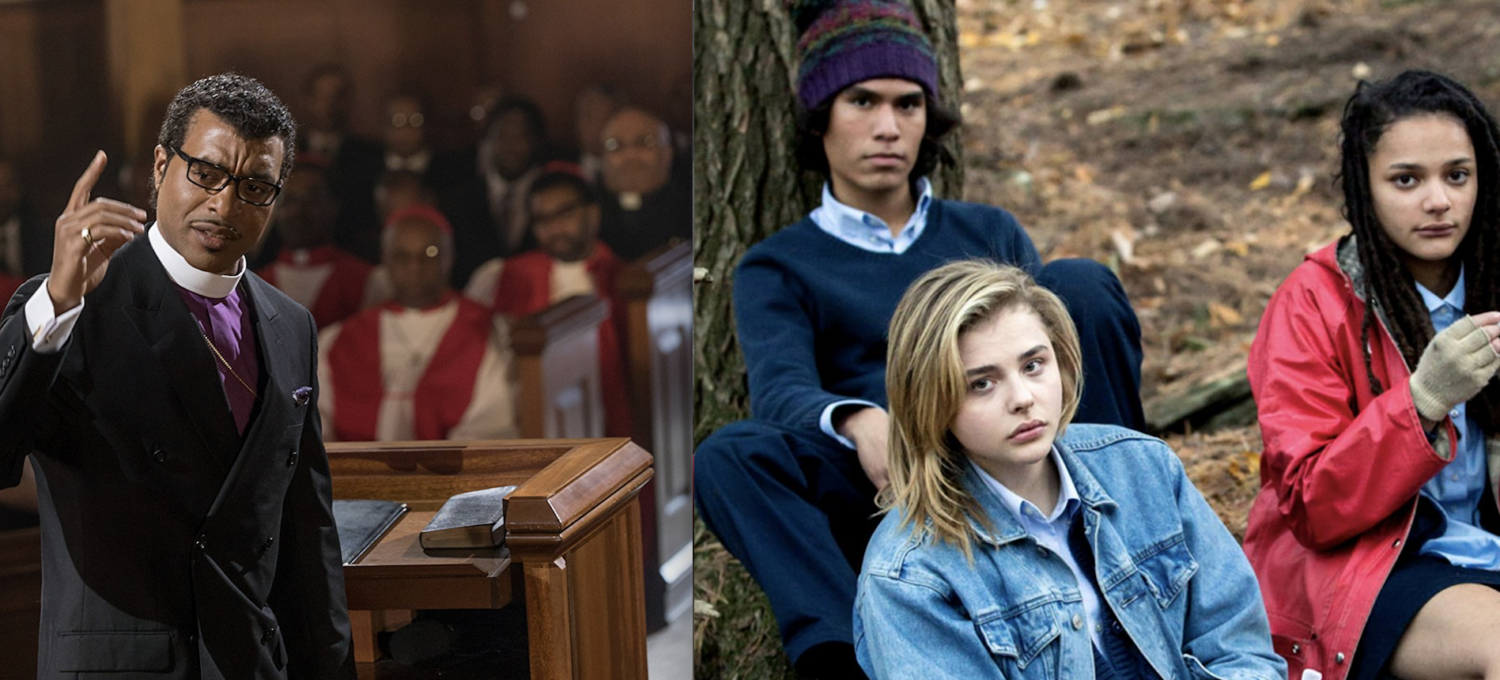Two films at Sundance center on belief, specifically Christian beliefs and what happens when we question them and/or force them on others. In Come Sunday, based on a true story, Chiwetel Ejiofor plays Bishop Carlton Pearson, a wildly popular mega church pastor, who questions the existence of hell and ultimately loses his church. In The Miseducation of Cameron Post (Sundance Grand Jury Prize winner), based on he novel by Emily M. Danforth, Chloë Grace Moretz plays a young woman who is sent away to a Christian conversion camp to “cure” her of her homosexuality.
Directed by Joshau Marston (Maria Full of Grace), Come Sunday (premiering on Netflix later this year) is one of those rare films that addresses a controversial religious topic without leaning too far to one side. When Bishop Pearson (Ejiofor) sees news coverage of children dying in Africa, he questions why a good and loving God would damn these non-Christian children to hell. When he rather quickly answers his own question that God couldn’t possibly damn these children to hell (this God would be “worse than Hitler”), he then gradually sees that this same love would (should) extend to everyone. When Bishop Pearson preaches this vision to his congregation, some members immediately walk out of the service, while others simply don’t come back the following week. It creates a rift between his fellow ministers as well, namely Henry (Jason Segal), who genuinely loves Carlton and fears that, by leading his congregants astray, Bishop Pearson is himself now bound for hell. Bishop Pearson’s theological shift also brings condemnation from his mentor, Oral Roberts (Martin Sheen), who once regarded him as his “black son.”
Come Sunday isn’t a theological film. That is, it’s not obsessed with whether or not Carlton is right. Rather, it’s a study in character and community and how belief works on us, how our beliefs change, and what these changes do to us and the people we love. Ejiofor gives another powerful performance both from the pulpit as a charismatic leader and in the privacy of his office, wrestling with whether or not this new revelation is actually a word from God. While there are professional consequences of Bishop Pearson’s change of heart–the loss of his church and broken relationships with mentors and colleagues–it is the familial struggle that resonates the most. Unlike most films about ministers, Come Sunday gives attention to the impact of ministry on pastors’ spouses, and, here, Condola Rashad is every bit Ejiofor’s equal in her portrayal of Bishop Pearson’s wife Gina. An independent woman who loves her husband but doesn’t necessarily love church life, she becomes his fiercest champion and suffers the struggle alongside him in equal measure.
One final performance and relationship is worth noting. Lakeith Stanfield gives another understated and moving performance as the church’s closeted music minister, Reggie, who eventually moves back home to Texas as a result of the schism. While Bishop Pearson arrives at a more progressive view of the afterlife, he is slower to change his thoughts on sexuality. And while any changes in these latter views remain less explicit, the film includes a beautiful scene of Bishop Pearson reconnecting with the ailing Reggie that implies compassion and inclusion.
In Miseducation, Cameron Post (Grace Moretz) is a high school junior, who falls in love with classmate Coley (Quinn Shephard). When Cameron’s prom date catches them making out in the back seat of his car, word of their relationship spreads. Cameron’s aunt sends her away to God’s Promise, a gay conversion camp run by brother/sister duo Rick (John Gallagher, Jr.) and Dr. Lydia Marsh (Jennifer Ehle). Lydia takes pride in her therapy because, after all, it worked on her brother. The duo play the role of good cop/bad cop as Rick tries to be a friend to the teenagers, playing games with them and leading them in joyful praise songs, while Lydia drills them with rigorous group and one-on-one counseling sessions to get to the root of their sexual sin. Lydia’s “therapy” is fueled by armchair psychology and ignorant interpretations of scripture, all of which are either irrelevant to her patients’ experiences, as is the case with Cameron, or downright torturous, leading one young man to mutilate himself in horrific fashion.
While Miseducation is something of a one-note film, it’s a note that many of our churches desperately need to hear. The film’s greatest strength comes from its titular character and the performance that fuels it. Until being sent away to camp, Cameron is a happy, healthy, and well-adjusted teenager, who just happens to be attracted to girls. Christianity—or at least the God’s Promise version of it—undoes Cameron’s self-confidence, inflicts psychological damage, and tears her away from the relationships that gave her life. Thankfully, at God’s Promise, she finds new friends, namely Jane (Sasha Lane) and Adam (Forrest Goodluck), and their conversations with and care for one another prove to be a more potent example of what lived faithful and spirituality community should look like.
Evangelical Christian views on homosexuality and their treatment of this community are helping to kill our LGBTQ youth, not save them…physically, spiritually, or otherwise. While a lesser filmmaker might not bother to, especially in the face of so much oppression, writer/director Desiree Akhavan does extend a hand of sympathy, albeit briefly, to Rick. As Lydia’s first convert, Rick cheerfully proclaims to the campers that change is possible, however, in the face of one teen’s breakdown, his joyful demeanor breaks. When Cameron questions the leaders’ motives and practices, Rick can’t respond and struggles to hold back tears.
Though based on a novel, Miseducation has countless real-world parallels that are proof that Catholics aren’t the only Christians guilty of child abuse. While it’s unlikely that a compassionate, progressive, Christian sexual ethic for teens would make for an entertaining film (where’s the conflict or the humor there!), perhaps films like Miseducation can shape the way we preach to, teach, and love LGBTQ kids in our communities.
